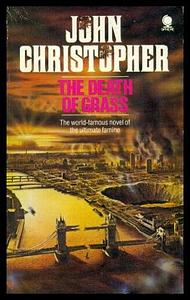You need to sign in or sign up before continuing.
Take a photo of a barcode or cover
A gripping white-knuckle ride through an apocalyptic England as a group struggle to reach safety after the death of grass. Very much a product of 1950s post-war Britain, it is a classic exploration of society descending into barbarism, reminiscent of John Wyndham and a forerunner of post-apocalyptic thrillers including The Walking Dead.
This is a really good, old-school dystopian sci-fi. Like "The World in Winter" by the same author, it takes a natural disaster and imagines how it affects the world, telling its story through the eyes of a small group of characters. This genre was still fairly new at the time so it doesn't have to try as hard to shock the reader, but there are a lot of themes in common with, say, The Walking Dead: the idea of having to fear other survivors almost as much as the ostensible danger, the idea of having to be ruthless to survive. The other interesting difference is the attitude to authority. In this book, the country's leaders are callous bastards of course, but they are trying to lead and to save as many as they can. I feel like if the book had been written today we'd be waiting for the big reveal in chapter 20 that - ta-daaa! - the virus was created in a government lab for some reason, and they were the real baddies all along. Likewise, science; whereas in the modern version, the scientists would be the willing dupes of the scheming deep-state sociopaths, in this, people trust in science to engineer a solution to the problem. As it happens, after a few years, nature wins, but there's no sense of betrayal or complicity.
To set this in context, it's written just a few years after the war. People are used to making do, used to having to fight and to do things they don't like. Britain still sees itself as basically competent and good (although the gone is by no means jingoistic). British Common sense will get everyone through in the end with the Yanks supporting in an echo of lend-lease.
It's very well done, in a par with John Wyndham's best work.
To set this in context, it's written just a few years after the war. People are used to making do, used to having to fight and to do things they don't like. Britain still sees itself as basically competent and good (although the gone is by no means jingoistic). British Common sense will get everyone through in the end with the Yanks supporting in an echo of lend-lease.
It's very well done, in a par with John Wyndham's best work.
adventurous
dark
reflective
sad
tense
medium-paced
Plot or Character Driven:
A mix
Strong character development:
Yes
Loveable characters:
Complicated
Diverse cast of characters:
Yes
Flaws of characters a main focus:
No
adventurous
dark
fast-paced
Plot or Character Driven:
A mix
Strong character development:
Yes
Loveable characters:
Yes
Diverse cast of characters:
Yes
Flaws of characters a main focus:
Yes
This book. Whew. Until the last few pages, this struck me as just another male master-of-the-universe ass-kicking savior fantasy. But no, this is a commentary on the superiority-complex-wielding society of the stiff upper lip and how quickly that would crumble when faced with a truly apocalyptic scenario, and also a wrenchingly biblical tale of two brothers.
Of special note is the rapidity with which women become commodities under male dominion. The horror.
Of special note is the rapidity with which women become commodities under male dominion. The horror.
adventurous
dark
reflective
tense
fast-paced
Well, this was a difficult novel to read, and equally hard to review. I read it compulsively to find out what would happen but I was often repulsed by it, not only by the story but by the choices Christopher made in writing his characters. Really this is a male power trip, full of misogyny, sexism, and casual racism. It was of course written in the 1950s, but that doesn't excuse all of it.
A virus has wiped out grass in China. The virus spreads to Europe and the UK. The government knows that famine will be coming and apparently decides that bombing all the large cities will be a way of decreasing the population so that at least some people survive. John has a brother who lives in a secluded valley in Westmorland and after a tip-off from a friend, he gathers his family, as well as various other people and they set off out of London heading towards the valley. This novel is the story of that journey, first in cars and then on foot and what happens along the way. And let me tell you a lot of bad things happen along the way. Lots of killing, and not only in self defence, and rape. Civilisation falls apart very quickly, and the men with the guns take control.
Christopher doesn't let any of the characters spend much time questioning the terrible events and their choices, including letting a man in his fifties taking a 'middle-teens' girl as his 'wife', after he shoots his own wife because he's bored of her being adulterous. And yet a boy with a blister on his heel is carried for miles by his parents.
I know I'm seeing this with 21st century eyes, but it's a troubling book. Is it a dystopian classic, or a misogynous horror? If you've read it let me know what you think.
A virus has wiped out grass in China. The virus spreads to Europe and the UK. The government knows that famine will be coming and apparently decides that bombing all the large cities will be a way of decreasing the population so that at least some people survive. John has a brother who lives in a secluded valley in Westmorland and after a tip-off from a friend, he gathers his family, as well as various other people and they set off out of London heading towards the valley. This novel is the story of that journey, first in cars and then on foot and what happens along the way. And let me tell you a lot of bad things happen along the way. Lots of killing, and not only in self defence, and rape. Civilisation falls apart very quickly, and the men with the guns take control.
Christopher doesn't let any of the characters spend much time questioning the terrible events and their choices, including letting a man in his fifties taking a 'middle-teens' girl as his 'wife', after he shoots his own wife because he's bored of her being adulterous. And yet a boy with a blister on his heel is carried for miles by his parents.
I know I'm seeing this with 21st century eyes, but it's a troubling book. Is it a dystopian classic, or a misogynous horror? If you've read it let me know what you think.
Short read, depressing survivalist tale of England in a desperate famine. Pulpy.


